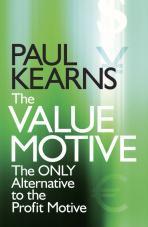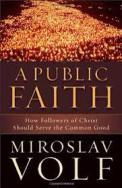Both before and since the welfare row that blew up recently – and with a minor excursus into who allows whom to contribute to the public discourse – I have been bothered by a missing question in most reportage. That question is: what is it all for? Put differently, what is the end to which welfare, taxation, work, profit, etc. is the means? This isn't a question of the function of any particular business, but the purpose of that business as a 'player' and shaper of wider society that is not neutral. I'll come back to this in a minute.
I was chatting to a (self-defined non-religious) business man recently about a massive problem that runs through our culture. With reference to Paul Kearns' The Value Motive and Kenneth Hopper & William Hopper's The Puritan Gift (which, in fact Paul put me on to), he considered that most business exists to make a profit – all well and good, pretty obvious, and totally valid. A business that does not make a profit won't exist at all. But, what is that profit for? Or, more precisely, for whom is that profit to be made – whom is it to serve? The business itself and those who own it or work for it, or wider society as a whole?

(Incidentally, these were broadly the questions behind speeches at the opening of new offices for the Pfarramt für Industrie und Wirtschaft in Basel last Thursday evening. And, even more incidentally, it is the question Aristotle puts at the heat of his ethics: telos, or the goal/end desired.)
At the beginning of his book A Public Faith, Miroslav Volf makes an observation that is pertinent here, describing Max Weber's view on the modern 'market':
If you play the game, you've got to play it by preset rules, which in the case of the market means that you must maximise profit; these rules, and not moral considerations, determine how the game is played. (p.14)
But, this simply points to the modern lie that has been conveniently assumed to be incontrovertibly obvious: the market dictates how we must follow it. This is nonsense. People drive markets by the choices they make. If profit is the ultimate goal – as opposed to a penultimate goal, a means to a greater end – then it is so because we have decided it should be so. There is nothing inevitable about this. Human agency, human responsibility and human choices dictate how markets are shaped, to what ends they are directed, and what values underlie them.

So, to go back to the original question, we must ask what is the point of it all. Christians (but not exclusively, of course) will argue that profit should be made, not as an end in itself, but in order to serve the common good of people and the planet. That is, economics should serve anthropology and not vice versa. We work to live, not live to work (although an argument can be made that human beings do live to work – which raises questions about those who refuse to work and how a moral society treats those who are unable to work).
And this is where some of us have a problem. Why is it a moral matter that poor people should be squeezed until they bleed – incentivised by being made poorer or more pressurised – whilst the same moral imperative ceases to apply to those who have the resources to play the system, get others to pay for their failures and get away with self-preservation as a sanction-free 'good'? Bankers and politicians got us into the catastrophic financial crisis of the last six years, but they seem not to be paying: the tax payers – including the poorer and squeezed ones – are paying for mistakes made by the rich. And the bonuses keep being paid. If the poor fail, they are disgraced and humiliated; if the powerful fail, they must be incentivised whilst others pay for their failure. Big-time tax evaders are not ritually humiliated in the press.
Is this justice?
Well, the point is not to relativise justice, but to ask what the point of profit is. If business put economics into an anthropological framework, asking whom this whole project is supposed to be for, it would find itself framing its language and choices differently. 'Corporate social responsibility' should not be a useful add-on, making people feel better about themselves (again, as an end in itself), but should be an integral purpose that shapes decisions about people.

In other words, profit should make society better and enable all people to flourish in a society for which we all take responsibility. A Christian theological anthropology can say nothing less.
And, ultimately, markets do not dictate anything. The people who create and shape markets do. And they do so according to assumptions they hold about human and economic purpose. People are responsible, not abstracted or personified dynamics behind which people can hide.
So, being pro-business, pro-work, pro-profit and pro-value, I simply ask where welfare and profit and taxation fit in to which anthropological ends we have decided to choose?
 Posted with Blogsy
Posted with Blogsy
